 91 citations,
August 2015 in “Anais Brasileiros De Dermatologia”
91 citations,
August 2015 in “Anais Brasileiros De Dermatologia” Female Pattern Hair Loss affects women's self-esteem and needs more research for better treatment.
 4 citations,
March 2015 in “Skin Research and Technology”
4 citations,
March 2015 in “Skin Research and Technology” Trichotillometry is a reliable method to measure hair strength and assess hair loss treatments.
 1 citations,
December 2020 in “Harran Üniversitesi týp fakültesi dergisi”
1 citations,
December 2020 in “Harran Üniversitesi týp fakültesi dergisi” Many people with hair loss had low iron and ferritin levels.
 April 2024 in “Frontiers in pharmacology”
April 2024 in “Frontiers in pharmacology” Cynoglossum amabile has medicinal potential but poses safety concerns due to liver toxicity.
 April 2024 in “The Journal of experimental medicine/The journal of experimental medicine”
April 2024 in “The Journal of experimental medicine/The journal of experimental medicine” Treg cells help repair and regenerate tissues by interacting with local cells.
 62 citations,
January 2013 in “Skin Pharmacology and Physiology”
62 citations,
January 2013 in “Skin Pharmacology and Physiology” Low iron and vitamin D levels are linked to hair loss in women.
 7 citations,
January 2018 in “Neurodegenerative Diseases”
7 citations,
January 2018 in “Neurodegenerative Diseases” Researchers found a new ABCD1 gene mutation linked to a rare brain and nerve disorder with unusual brain changes.
 9 citations,
January 2018 in “International Journal of Trichology”
9 citations,
January 2018 in “International Journal of Trichology” A woman's hair loss from graft versus host disease helps understand similar hair loss conditions.
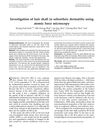 17 citations,
January 2011 in “Skin Research and Technology”
17 citations,
January 2011 in “Skin Research and Technology” Hair from people with seborrheic dermatitis is thicker scaled, more damaged, and thinner than healthy hair, and atomic force microscopy can help monitor the condition.
194 citations,
October 2018 in “Microbiome” Acne is linked to complex skin microbe interactions, and new findings suggest microbiome-based treatments could be effective.
 84 citations,
February 2013 in “Clinica chimica acta”
84 citations,
February 2013 in “Clinica chimica acta” Hair mineral analysis might help diagnose diseases early, but standard methods are needed.
 13 citations,
April 2022 in “Frontiers in oncology”
13 citations,
April 2022 in “Frontiers in oncology” Melanoma development can be linked to the breakdown of skin's melanin-producing units.
 11 citations,
January 2011 in “Turkish Journal of Medical Sciences”
11 citations,
January 2011 in “Turkish Journal of Medical Sciences” Low iron levels are a significant risk factor for hair loss, while high vitamin D levels might be a response to hair loss, not a cause.
 April 2024 in “Nigerian Postgraduate Medical Journal”
April 2024 in “Nigerian Postgraduate Medical Journal” Androgenetic alopecia is a common hair loss condition influenced by various factors and linked to psychosocial and cardiovascular issues.
 32 citations,
April 2015 in “British Journal of Dermatology”
32 citations,
April 2015 in “British Journal of Dermatology” The hair shedding scale accurately identifies abnormal hair shedding in women with long hair, with grades 5 and 6 indicating excessive shedding.
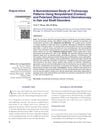 34 citations,
January 2014 in “International Journal of Trichology”
34 citations,
January 2014 in “International Journal of Trichology” Polarized dermoscopy is slightly better than nonpolarized for diagnosing hair disorders, with each method having its own strengths.
 6 citations,
January 2011 in “Springer eBooks”
6 citations,
January 2011 in “Springer eBooks” Nutrition is important for skin health, and changing diet can help prevent and treat skin diseases.
12 citations,
January 2019 in “International Journal of Trichology” Trichoscopy is useful for detecting and monitoring androgenetic alopecia.
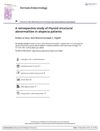 11 citations,
October 2011 in “Dermato-endocrinology”
11 citations,
October 2011 in “Dermato-endocrinology” Many alopecia patients have undetected thyroid abnormalities that can be found through physical exams.
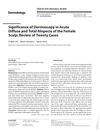 42 citations,
January 2008 in “Dermatology”
42 citations,
January 2008 in “Dermatology” Dermoscopy effectively distinguishes between acute total hair loss and other types of female hair loss.
 January 2018 in “Springer eBooks”
January 2018 in “Springer eBooks” Men and women need different facial rejuvenation treatments due to distinct aging processes and anatomical differences.
Aesthetic rehabilitation techniques can improve life quality and wellbeing for disabled patients.
 22 citations,
January 2015 in “The Cochrane library”
22 citations,
January 2015 in “The Cochrane library” DHEA may help with sexual function when used intravaginally by menopausal women but is similar to hormone therapy in other aspects and might cause more side effects like acne and hair loss.
 68 citations,
February 2015 in “Journal of the European Academy of Dermatology and Venereology”
68 citations,
February 2015 in “Journal of the European Academy of Dermatology and Venereology” Early onset and pustules indicate severe hair follicle inflammation, and while antibiotics help, the condition often worsens after treatment stops.
 January 2015 in “Springer eBooks”
January 2015 in “Springer eBooks” Chronic kidney disease can cause hair loss, which may be related to zinc deficiency or certain medications, and sometimes hair grows back when the underlying issue is treated.
 41 citations,
June 2010 in “Clinics in Dermatology”
41 citations,
June 2010 in “Clinics in Dermatology” Smoking harms skin health, causing slower wound healing, more wrinkles, and worsening some skin conditions, but may protect against certain others.
 1 citations,
January 2017 in “International Journal of Dermoscopy”
1 citations,
January 2017 in “International Journal of Dermoscopy” Digital imaging can effectively evaluate the donor area for hair transplants, showing variations in hair density and grouping by age and severity of hair loss.
3 citations,
January 2021 in “Medicinski arhiv” Trichoscopy, a hair loss evaluation technique, found that people with Androgenetic Alopecia have more thin hairs, yellow dots, and perifollicular discoloration than healthy individuals.
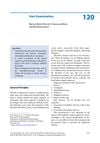 January 2015 in “Springer eBooks”
January 2015 in “Springer eBooks” Understanding hair structure and growth is key for diagnosing hair diseases accurately.
 109 citations,
November 2004 in “Lupus”
109 citations,
November 2004 in “Lupus” The paper concludes that the 1982 criteria for diagnosing systemic lupus erythematosus need updating to improve accuracy and involve dermatologists in the process.


























